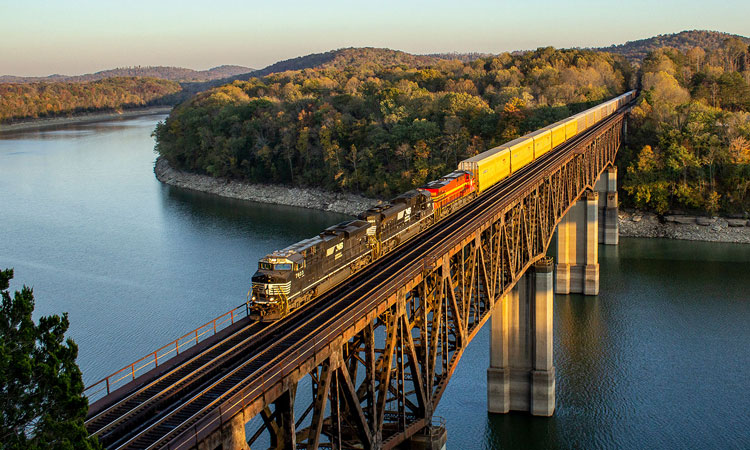Norfolk Southern outlines plans to reduce greenhouse gas emissions
Posted: 30 July 2021 | Global Railway Review | No comments yet
Norfolk Southern’s emissions reduction target has been approved by the Science Based Targets initiative (SBTi) and aligns with the goals of the Paris Agreement on climate change.


Credit: Norfolk Southern
Norfolk Southern – one of North America’s premier transportation companies – has announced its science-based target to achieve a 42 per cent reduction in scope 1 and 2 greenhouse gas (GHG) emissions intensity by 2034 from a 2019 base year.
This commitment is another step in the company’s ongoing journey to build a more sustainable future.
James A. Squires, Chairman, President, and CEO of Norfolk Southern, said: “As a leading transportation provider, it is our responsibility to reduce our environmental impact and also to help our customers reduce their carbon footprint. In recent years, our customers have avoided 15 million metric tonnes of carbon emissions annually by shipping their goods and materials with Norfolk Southern. Shipping by rail instead of truck lowers carbon emissions by 75 per cent on average, relieves traffic congestion, and reduces wear on public infrastructure.”
Norfolk Southern’s emissions reduction target has been approved by the Science Based Targets initiative (SBTi) and aligns with the goals of the Paris Agreement on climate change. Validation from the SBTi – a joint initiative of CDP, UN Global Compact, the World Resources Institute, and World Wide Fund for Nature – confirms that the company’s target is consistent with reductions required to keep warming to well-below 2°C above pre-industrial levels.
Norfolk Southern’s Chief Sustainability Officer, Josh Raglin, said: “Achieving our target will require continued investments in our locomotive fleet along with supplier engagement. Our implementation of innovative technologies, sustainable operating practices, and locomotive modernisations are part of our efforts to build a more sustainable transportation network.”
Locomotive fuel accounts for over 90 per cent of the railroad’s carbon emissions. Norfolk Southern set a fuel-efficiency goal as part of its 2015 strategic plan, targeting an 8.6 per cent improvement by 2020. The company exceeded that goal with a 9.4 per cent improvement, which resulted in savings of more than 130 million gallons of diesel fuel and avoidance of approximately 1.3 million metric tonnes of emissions.
Norfolk Southern is making significant efforts to lower GHG emissions across the company, including:
- $500 million of green bonds were recently issued by the company to fund eligible green projects. Norfolk Southern was the first Class I railroad in North America to launch green bond financing.
- More than 700 locomotives were retired by the company in 2020, targeting older, less fuel-efficient models. Through precision scheduled railroading, the company has achieved operating efficiencies which allow for the movement of more freight with fewer locomotives, reducing fuel burn.
- A company locomotive modernisation programme is converting older DC traction models to more reliable and efficient AC units, providing more pulling power with fewer locomotives.
- The company is equipping locomotives with smart energy management technology that automatically matches horsepower to trailing tonnage and track terrain, maximising fuel efficiency using the minimum horsepower.
- An innovative public-private partnership program to recycle older locomotives into low-emission ‘Eco’ models is reducing emissions in urban communities on our rail network and enabling them to meet their Clean Air Act obligations.
- An initiative to replace diesel-powered overhead cranes with hybrid and fully electric cranes at company intermodal facilities is projected to reduce emissions at those facilities by approximately 75 per cent.
Josh added: “Our goal with all of these sustainable business initiatives is to continue creating value that generates benefits for our stakeholders, whether they be customers, employees, communities, or shareholders. We are accelerating our efforts to deliver a low-carbon economy and promote cleaner air in our communities.”
Related topics
Cargo, Freight & Heavy-Haul, Rolling Stock Orders/Developments, Sustainability/Decarbonisation







